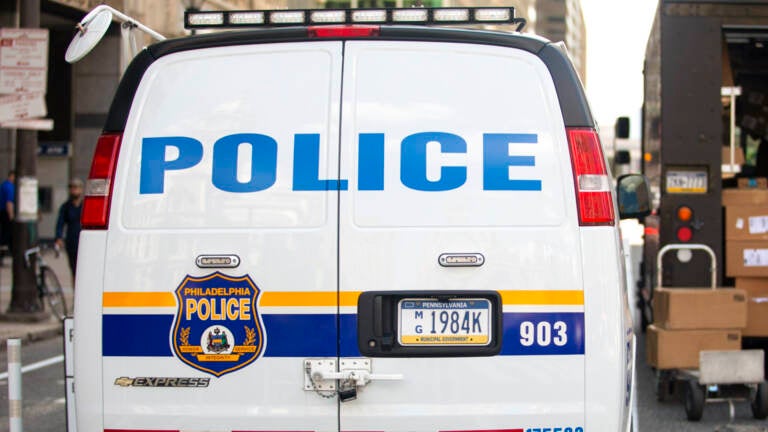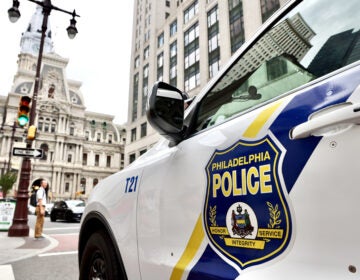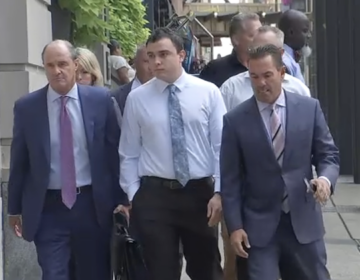Philly police say analysis of 911 response times between Black and white neighborhoods is ‘devoid of context’
Commissioner Danielle Outlaw joined the FOP challenging a city controller’s report that said police responded faster to white neighborhoods.

(Miguel Martinez/Billy Penn)
Philadelphia Police commissioner Danielle Outlaw joined leaders of the officers’ union to push back on findings in a report from the City Controller’s Office that analyzed police department spending and provided recommendations for progress.
Controller Rebecca Rhynhart’s review, done at the request of City Council’s Police Reform Working Group, suggested changes intended to boost foot patrols, speed 911 response times, and generally make the department more efficient with better data tracking.
The most scathing accusations center on the report’s analysis of 911 responses. That found a correlation with more white residents getting quicker emergency response, while areas that were majority Black and Latino residents got a slower response, with average waits as high as 40 minutes.
“The analysis of 911 Response Time data in this report is not inaccurate, but the conclusions provided are devoid of context,” commissioner Danielle Outlaw said in a post on Twitter Wednesday afternoon. “Our most high-crime districts often experience higher priority assignments which are complex and require more time to complete, and this reduces the amount of officers available to answer pending 911 events.”
The analysis of 911 Response Time data in this report is not inaccurate, but the conclusions provided are devoid of context. Our most high-crime districts often experience higher priority assignments which are complex and require more time to complete, and this reduces... https://t.co/P01itexWEa
— Danielle M. Outlaw (@PPDCommish) October 19, 2022
Outlaw’s department cooperated with the Controller’s Office throughout the report process and didn’t address those concerns in a letter included in the 70-page report. pages.
Philly FOP president John McNesby refuted any allegations of officer bias.
“We don’t receive a call for an auto accident saying ‘it’s a white male or a black male behind the wheel,” he said. “We answer calls in the order that we receive them, in the priority that we receive them, not by race, not by color, not by creed, not by national origins.”
McNesby, president of the Philadelphia Fraternal Order of Police Lodge #5, didn’t respond to a request for comment on Tuesday, the day the report was released. At a Wednesday press briefing, he claimed the report is flawed, and suggested the city controller was using it as a stepping stone for her likely campaign to become Philadelphia’s next mayor.
“If you want to run for mayor, we wish you luck,” McNesby said, “but don’t try to do it on the backs of hardworking, overworked police officers in the City of Philadelphia.”
The report, which analyzed police spending from fiscal years 2017 through 2021, also included details about the average number of patrol officers in a given police district.
Like many departments in Philadelphia government, the PPD has been dealing with understaffing. It’s also facing issues with attrition (people leaving the force) and recruitment. At the same time, a recent Inquirer report found many officers are often out on lengthy disability leave.
Homicides, shootings, and overall violent crime are all up in Philadelphia compared to before the pandemic.
The controller’s review found there were as few as 11 officers reporting for shifts in some police districts. McNesby said that number sometimes dropped to as few as four officers.
“I’d love to have 11 to 22 people at some roll calls,” he said, “because right now, that’s not happening. Everything is blamed on the City of Philadelphia Police Department. We go out and do the job diligently every day.”
McNesby added that he would love to do more to recruit and put more cops on the street, and laid blame on Mayor Jim Kenney’s administration, saying it had stopped working with the FOP to address the issue.
“We have been working with the city, attempting to sit down and it was working very well. I don’t want anybody hanging out there with a hangnail, but I don’t want anybody going back to work with a broken limb either,” he said, addressing concerns over disability leave. “So we had a happy medium where we were working together. The city administration stopped that.”
A spokesperson for Mayor Kenney said they are continuing to work with the union to sort out the issues.
WHYY is your source for fact-based, in-depth journalism and information. As a nonprofit organization, we rely on financial support from readers like you. Please give today.




